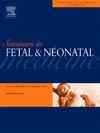Platelet transfusion and bleeding risk
IF 2.9
3区 医学
Q1 PEDIATRICS
引用次数: 0
Abstract
In neonatal patients, bleeding is a multifactorial event in which several factors may play a pathogenic role. Among these, thrombocytopenia is often considered a risk factor for bleeding, although a causal relationship has never been demonstrated. In fact, major bleeding mainly occurs in non-thrombocytopenic newborns and thrombocytopenic newborns rarely experience major bleeding. Therefore, parameters other than platelet count might better assess the hemostatic function and define bleeding risk. Historically, neonatologists aimed to reduce the risk of bleeding by administering platelet transfusions. However, recent studies demonstrated that transfusing newborns at higher threshold is associated with an increased risk of death, bleeding, bronchopulmonary dysplasia and neurodevelopmental impairment. The mechanism behind this association is not known and various hypotheses have been proposed, including the non-hemostatic effects of adult-derived platelets transfused into neonates. Alternatively, the rapid volume expansion caused by a platelet transfusion might cause hemodynamic instability and cardiocirculatory overload. Guidelines about platelet transfusions should now include this recent evidence and adopt more stringent thresholds. Future research should focus on finding alternative or improved transfusion products more suitable for newborns.
血小板输注和出血风险。
在新生儿患者中,出血是一个多因素事件,其中几个因素可能起致病作用。其中,血小板减少症常被认为是出血的危险因素,尽管其因果关系从未得到证实。事实上,大出血主要发生在非血小板减少性新生儿,血小板减少性新生儿很少发生大出血。因此,血小板计数以外的参数可能更好地评估止血功能和确定出血风险。从历史上看,新生儿学家的目标是通过输血小板来降低出血的风险。然而,最近的研究表明,较高阈值的新生儿输血与死亡、出血、支气管肺发育不良和神经发育障碍的风险增加有关。这种关联背后的机制尚不清楚,人们提出了各种假设,包括将成人来源的血小板输注到新生儿体内的非止血作用。另外,血小板输注引起的容量迅速扩大可能导致血流动力学不稳定和心脏循环负荷过重。血小板输注指南现在应包括这一最新证据,并采用更严格的阈值。未来的研究应侧重于寻找更适合新生儿的替代或改进的输血产品。
本文章由计算机程序翻译,如有差异,请以英文原文为准。
求助全文
约1分钟内获得全文
求助全文
来源期刊
CiteScore
6.40
自引率
3.30%
发文量
49
审稿时长
6-12 weeks
期刊介绍:
Seminars in Fetal & Neonatal Medicine (formerly Seminars in Neonatology) is a bi-monthly journal which publishes topic-based issues, including current ''Hot Topics'' on the latest advances in fetal and neonatal medicine. The Journal is of interest to obstetricians and maternal-fetal medicine specialists.
The Journal commissions review-based content covering current clinical opinion on the care and treatment of the pregnant patient and the neonate and draws on the necessary specialist knowledge, including that of the pediatric pulmonologist, the pediatric infectious disease specialist, the surgeon, as well as the general pediatrician and obstetrician.
Each topic-based issue is edited by an authority in their field and contains 8-10 articles.
Seminars in Fetal & Neonatal Medicine provides:
• Coverage of major developments in neonatal care;
• Value to practising neonatologists, consultant and trainee pediatricians, obstetricians, midwives and fetal medicine specialists wishing to extend their knowledge in this field;
• Up-to-date information in an attractive and relevant format.

 求助内容:
求助内容: 应助结果提醒方式:
应助结果提醒方式:


